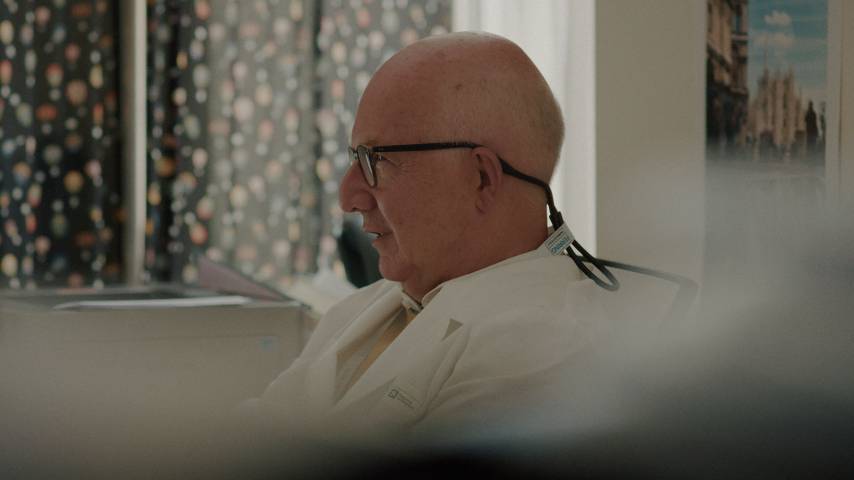Sundance documentaries tackle gender-affirming care, cancer treatment, and warmongering
Our second Sundance 2025 dispatch highlights GEN_, Come See Me In The Good Light, and other nonfiction films.
Photo: Sundance
Aside from the starry, flashy documentaries usually floating around the festival scene, the 2025 Sundance Film Festival also offers a large selection of nonfiction films from around the world. These range from movies smuggled out of Russia to cinema centered on a musical movement born right here in Chicago, but the best attack the political from an angle increasingly relatable from across any aisles: healthcare.
So far, the best doc of the fest has been GEN_ (B+), Gianluca Matarrese’s intimate look at the daily work done by Dr. Maurizio Bini at his fertilization and gender-affirming care facility in Milan. Matarrese stays out of the film’s way, shooting patient meetings, procedures, and staff interactions without ever inserting himself. The fly-on-the-wall feeling is enhanced by the hazy close-ups that embrace obscured focus and out-of-frame heads in order to make us feel like we’re there in the room with them.
Once there, we don’t just share the room with Dr. Bini and those looking to change their lives with his help—we share their secrets, their dreams. We hope everyone who wants to get pregnant gets pregnant, we hope everyone who wants their body and governmentally recognized name to match how they see themselves finds the resolution they deserve. Bini isn’t just an empathetic, charismatic force, but a courageous one; his conservative Catholic country is cracking down on who can get what kinds of care, and Bini is willing to stretch the laws to the point that they snap.
It’s always easier to like a documentary with an angle you agree with or subject matter you’re personally invested in, but GEN_ succeeds even if it started life on third base. That’s mostly because, though the aesthetic approach is minimalist and focused, the star of the show is clear. Bini is soft-spoken, funny, curious, and compassionate. In a world increasingly hostile to those needing medical care of any kind, he’s always saying the right things with the same kind of eccentric warmth that makes Orna Guralnik from HBO’s Couples Therapy such a watchable screen presence. As he juggles everyone from older hopeful mothers to adolescents still figuring out their gender identities to construction workers insistent on rattling the walls while his team painstakingly attempts to perform microscopic injections, Bini is worth rooting for throughout. It’s a warm, reassuring film about what one expert can do, and it’s about as feel-good as documentaries get.
On the other side of the emotional spectrum, squarely in the “we all feel like shit, but we carry on” weepy camp, is Come See Me In The Good Light (C+). Spoken word poet Andrea Gibson is dying of terminal ovarian cancer, cancer that they’ve been battling for much longer than their diagnosis ever expected. Their girlfriend and fellow poet Megan Falley supports as best she can, stuck in the limbo between attempting to appreciate every moment and realizing that this very attempt has, to an extent, trapped them both. Gibson’s always-renewing lease on life keeps them pressing forward, though as the film tracks the pair as they navigate life’s end and death’s inevitability, the blanketed sadness and twee subjects make it even harder to swallow.
But of course one should expect exposed-nerve emotions from a tragic doc about a dying poet. Gibson’s readings form the backbone of director Ryan White’s wide-eyed style, and appreciating their work becomes a big part of appreciating the doc itself. When Gibson and Falley are just being themselves around each other, the little prickly things about love emerge more beautifully than in the breathy beats of these voiceover readings. Learning about Gibson’s ‘roid rage from their treatment, and Falley’s acceptance of it, is a more moving example of their care for one another than much of what the film finds in their shared profession.
Aside from the more specific parts of the Gibson-focused doc—which does a serviceable job outlining their path from childhood to becoming the gay rock star of their poetry scene—there is a secondary, almost backgrounded portrait of the American medical system. Those with any experience dealing with a chronic illness, or a loved one living with one, will recognize the exhausting cycle of doctor visits, test results, and nervous waiting. They will look past the specific, and see the universal worrying about bills, about debt, about dying and leaving those closest to you saddled with your imbalanced account. Just brushing against this system is enough to salt your reluctant tears with rage.
The Dating Game (C-) scratches the surface of another fascinating and potentially infuriating system: online dating in China. The apps suck, the ratios are skewed, the conversations intolerable. And that’s in America, where we’re not recovering from a national policy that enforced a numerical imbalance between men and women. Violet Du Feng’s frustratingly surface-level film focuses on what it’s like for a couple of luckless schlubs looking for love in this environment. In particular, luckless schlubs banking everything on a dating coach named Hao.
Hao operates with a classic pickup artist’s mindset. He’s all about negging, ignoring, pushing yourself on women, and massaging the truth to make yourself look good. His wife, also a dating coach, seems like she can barely put up with him, and only because she knows his bluster is all a façade. But Hao’s clients don’t know that. A little older, a little more awkward, a little less refined, a little broke—these men see themselves as having few options in a hyper-competitive dating scene, and yearn for connection.





















![Rob Reiner's son booked for murder amid homicide investigation [Updated]](https://img.pastemagazine.com/wp-content/avuploads/2025/12/15131025/MixCollage-15-Dec-2025-01-10-PM-9121.jpg)


















